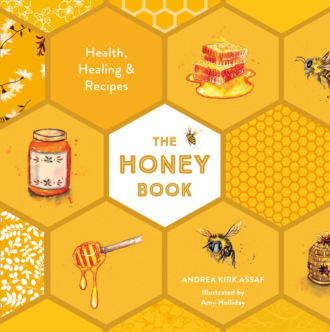
Полная версия
The Honey Book


DEDICATION
Dedicated to all queen bees, honey kings, and bee buddies – and most especially to Honey King TJD
NOTE TO READERS
This ebook contains the following accessibility features which, if supported by your device, can be accessed via your ereader/accessibility settings:
Change of font size and line height
Change of background and font colours
Change of font
Change justification
Text to speech
Page numbers taken from the following print edition: ISBN 978-0-00-843011-5
COPYRIGHT
HarperCollinsPublishers
1 London Bridge Street
London SE1 9GF
www.harpercollins.co.uk
First published by HarperCollinsPublishers in 2021
Copyright © HarperCollinsPublishers 2021
FIRST EDITION
Cover design © HarperCollinsPublishers
Author: Andrea Kirk Assaf
Illustrator: Amy Holliday
Cover and interior designer: Jacqui Caulton
Copyeditor: Rachel Malig
Proofreader: Helena Caldon
Indexer: Ben Murphy
A catalogue record of this book is available from the British Library
All rights reserved under International and Pan-American Copyright Conventions. By payment of the required fees, you have been granted the nonexclusive, non-transferable right to access and read the text of this e-book on screen. No part of this text may be reproduced, transmitted, downloaded, decompiled, reverse engineered, or stored in or introduced into any information storage retrieval system, in any form or by any means, whether electronic or mechanical, now known or hereinafter invented, without the express written permission of HarperCollins e-books.
Note from the Publisher
Disclaimer:
The information in this book is not intended to be taken as a replacement for medical advice or the services of trained and qualified health professionals. Any person with a condition requiring medical attention should consult a qualified practitioner. While very rare, an allergic reaction to honey can occur in some individuals with pollen allergies. If this happens, consult a doctor immediately. It is not recommended to give honey to children under one year old.
Find out about HarperCollins and the environment at www.harpercollins.co.uk/green
Source ISBN 978-0-00-843011-5
Ebook Edition © March 2021 ISBN: 978-0-00-846060-0
Version 2021-04-16
CONTENTS
Cover
Title Page
Dedication
Note to Readers
Copyright
CHAPTER ONE
The surprising history and lore of honey
CHAPTER TWO
The many sources and flavours of honey
CHAPTER THREE
A honey buyer’s guide – how to avoid fool’s gold and find the real deal
CHAPTER FOUR
Food and drink recipes with honey
Honey-Ginger Lemonade Punch
Maya’s Honeyed Hot Cocoa
Fruit Smoothie
Gold Rush
The Bee’s Knees
Spiced Hot Honey Toddy
Tony’s Crazy Tea
Café Miel
Goat’s Cheese, Honey and Fruit Crostini
Prosciutto Honey Wraps
Honey-Soy Salad Dressing
Honey-Lemon Dressing
Versatile Honey-Mustard Sauce
Honey-Lime Chicken Skewers
Stout and Honey Beef Roast
Honey-Garlic Pork Chops
Honey Haddock
Honey-Brined Grilled Prawns
No-Bake Honey Energy Bites
Honey Cake with Honey Buttercream Icing
Apple Baklava Bites
CHAPTER FIVE
Honey healthcare and beauty recipes
CHAPTER SIX
Honey wisdom
Additional Resources
List of searchable terms
Acknowledgements
About the Author
About the Illustrator
About the Publisher
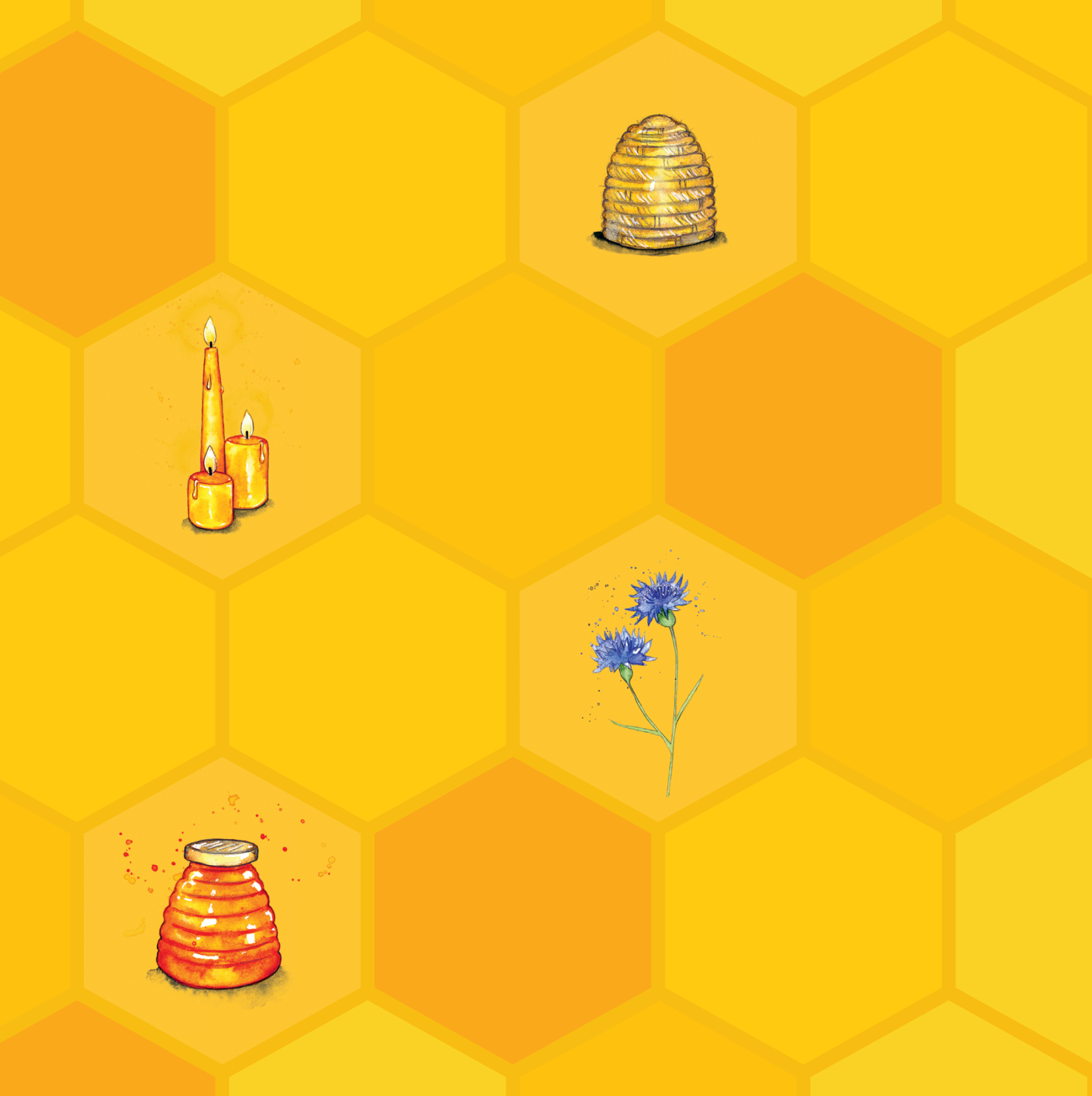

CHAPTER ONE
THE SURPRISING HISTORY AND LORE OF HONEY
No other insect in existence has been more intently studied, experimented upon, worshipped and exploited than the humble honey bee. And the cause of it all has been what we get out of our relationship with that tiny creature – the sweet liquid that only a bee can produce, and which so delights human tastebuds that it has been described as the food of the gods: honey.
The origins of different foods are fascinating and complex, but nothing that we still put on our tables today can hold a candle to honey in terms of culinary history. Humans have been harvesting honey for nearly as long as we have existed, with records of the practice being documented in stone 8,000 years ago in the Cuevas de la Araña (‘Spider Caves’), in Bicorp, Spain. The figure depicted on the cave wall is teetering precariously on a ladder, swiping honey from a wild bees’ nest; that honey hunter would have suffered greatly for his or her prize. Incredibly, that same dangerous method is still in use today, though it is a swiftly dwindling tradition. Immense beehives high up on Himalayan cliffs in Nepal have, for centuries, inspired Gurung tribespeople to risk life and limb climbing rope ladders barefoot in order to cut off the honeycomb that is literally dripping over the sides of nests constructed within crevices.
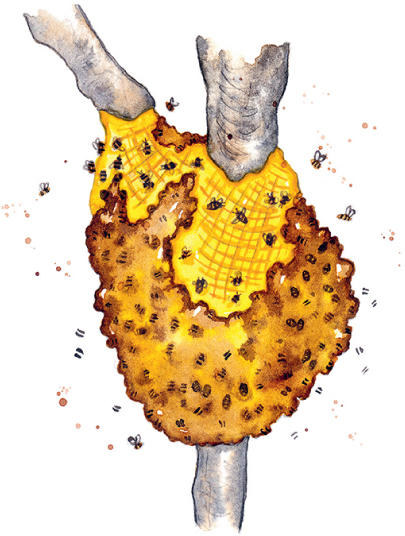
DID YOU KNOW?
Honey is the only food humans eat that is produced by an insect.
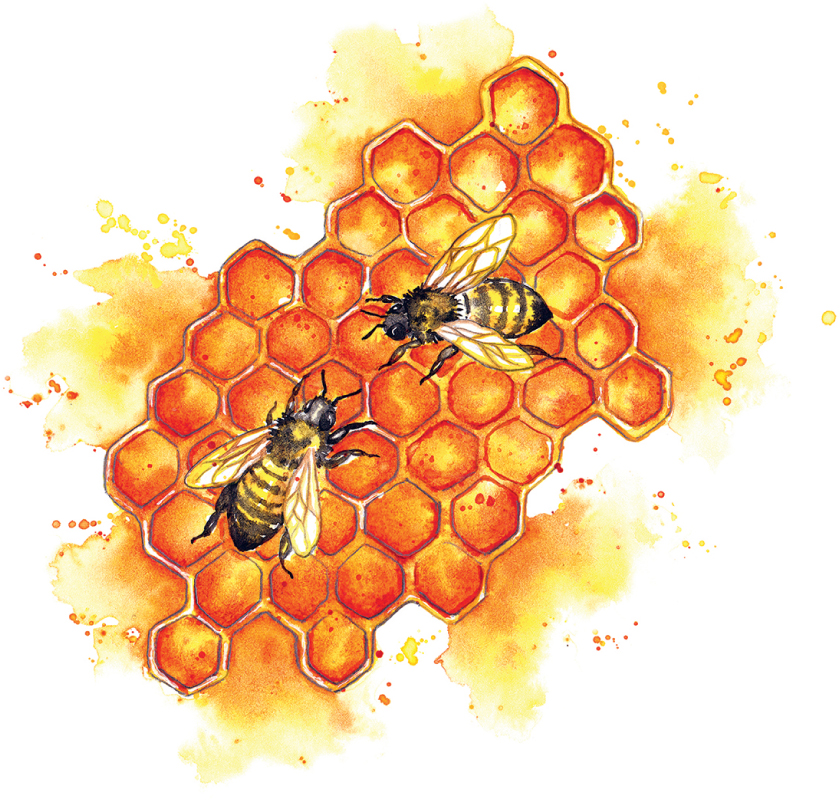
WHY ARE WE SO CRAZY ABOUT HONEY?
Humans are predisposed to crave sweetness in all its forms because sugar means energy, and energy means growth. From our mother’s milk to our first teaspoon of honey, the best things in life are sweet!
For thousands of years, honey (from the Old English word ‘hunig’) would have been consumed in a very raw form – comb, brood and all – as it still is by some today. It wasn’t until 1865 that a device was created to efficiently separate the honey from the comb. The centrifugal honey extractor, invented by Major Franz Elder von Hruschka, a Viennese who resided in Venice, signalled a huge development for beekeepers, allowing them to reuse the honeycomb and thereby maintain and grow their hives. Though there are several other methods still in use, the majority of commercial beekeepers today depend upon this invention.
The invention of the centrifugal extractor, along with wooden bee boxes with removable frames, allowed for the growth of commercial beekeeping, making honey harvesting a more profitable business.
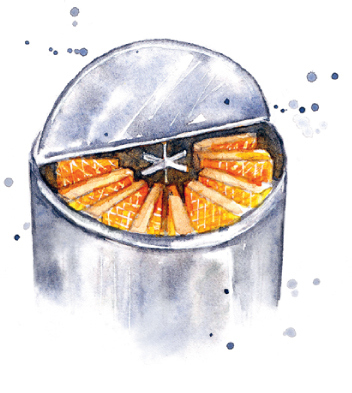
Конец ознакомительного фрагмента.
Текст предоставлен ООО «ЛитРес».
Прочитайте эту книгу целиком, купив полную легальную версию на ЛитРес.
Безопасно оплатить книгу можно банковской картой Visa, MasterCard, Maestro, со счета мобильного телефона, с платежного терминала, в салоне МТС или Связной, через PayPal, WebMoney, Яндекс.Деньги, QIWI Кошелек, бонусными картами или другим удобным Вам способом.

